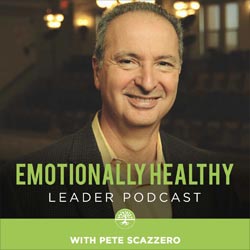


👉 Download the FREE Emotionally Healthy Leader Discussion Guide at emotionallyhealthy.org/leader
—---------------------------------------------------
Most Christian leaders are taught to prioritize ministry first—leaving marriage, singleness, and sexuality in the shadows. But what if the loudest gospel we preach isn't from our pulpits, but from how we live out our deepest relationships?
In this powerful episode, Pete Scazzero uncovers a profound, often overlooked truth: your marriage (or singleness) is not a private matter—it’s a sign and wonder, a living revelation of God’s love to the world. Drawing from decades of ministry, his own marriage journey with Geri, and Scripture’s radical vision for union, Pete challenges leaders to flip the script.
This isn’t about managing your relationships. It’s about transforming your leadership from the inside out.
If you're married, make your spouse your first ambition. If you're single, live out your calling with the same intentionality. The church will never be whole until we lead out of healthy, loving, God-centered relationships.
Listen now—and join the revolution.

In this 4th and final episode of a sermon series on the life of Jacob, Pete observes the life of Jacob in contrast to his son Joseph. One lived as if all things were against him. The other lived knowing God was for him even in difficult circumstances. How might you be living?
To download a free e-book on Six Marks of a Church Culture that Deeply Changes Lives visit www.emotionallyhealthy.org/churchculture.

In "Hard Lessons from the Life of Jacob: Part 3" Pete shares how Jacob finally faced his most difficult conflicts, became crippled in the process, but was changed by God.
To download a free e-book on Six Marks of a Church Culture that Deeply Changes Lives visit www.emotionallyhealthy.org/churchculture.

Tension. Distress. Difficulty. Pressure. Do these adjectives describe some days in your leadership? In Part 2 of “Hard Lessons from the Life of Jacob” Pete shares how God met Jacob in the mess, strain and conflict of his leadership. God is there to do the same in our own difficult leadership days.
To download a free e-book on Six Marks of a Church Culture that Deeply Changes Lives visit www.emotionallyhealthy.org/churchculture.

Jacob offers us a rich study of leadership. While he was richly blessed by God – chosen, destined to greatness, and deeply loved – he struggled to rest in that reality. In Part 1 of this series, Pete unpacks the lessons of Jacob’s exploitation of Esau to ensure he gets God’s blessings for the future.
To download a free e-book on Six Marks of a Church Culture that Deeply Changes Lives visit www.emotionallyhealthy.org/churchculture.

Jesus’ challenge to the leaders in his day, found in his sermon in Matthew 23, is so biting and sharp that some interpreters have wondered if these words are authentically Jesus’. They are. In this podcast, Pete breaks down Jesus’ challenge into 5 categories and shares how it applies to us today.
To download a free e-book on Six Marks of a Church Culture that Deeply Changes Lives visit www.emotionallyhealthy.org/churchculture.

Pete invites you into his personal journey of slowly breaking patterns and behaviors of overfunctioning. After considering the examples of Moses and Martha as classic overfunctioners, he lays out the three steps he took to stop overfunctioning.
To download a free e-book on Six Marks of a Church Culture that Deeply Changes Lives visit www.emotionallyhealthy.org/churchculture.

When we cross the line into “fixing” our ministries instead of leading them forward to greener pastures, we are overfunctioning. Pete invites you to listen to Geri’s reading of the audio version of an outstanding chapter out of The Emotionally Healthy Woman called “Quit Overfunctioning.” By the time you finish, it will make sense why quitting overfunctioning is foundational to leadership.
To download a free e-book on Six Marks of a Church Culture that Deeply Changes Lives visit www.emotionallyhealthy.org/churchculture.

In part 2 of this podcast series, Pete explores four additional goals we frequently overlook in our leadership. To download a free e-book on Six Marks of a Church Culture that Deeply Changes Lives visit www.emotionallyhealthy.org/churchculture.

Setting priorities as a Christian leader is one of our most challenging and difficult tasks. If we get it right, fruitfulness and joy follow. If we get it wrong, feelings of failure and misery follow. This podcast (Part 1 of 2) will consider, in detail, the most frequently overlooked priority and goal of our leadership.
To download a free e-book on Six Marks of a Church Culture that Deeply Changes Lives visit www.emotionallyhealthy.org/churchculture.

This podcast, a 15-minute experience of silence and stillness before the Lord, is our Christmas gift to you, our way of saying “thank you” for being one of our faithful podcast listeners. For the fuller experience with Jesus, please find the video titled "Breathe: Being with God in Silence" on our YouTube page.





